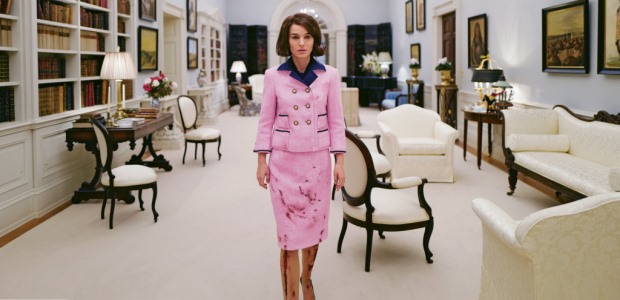It takes a few minutes to get used to Natalie Portman mimicking Jacqueline Kennedy’s voice, but once you do, it becomes hypnotic like everything else in this film. Starting with those wailing violins followed by unflattering close-up cinematography, Jackie becomes a haunting experience and ultimately a crushing story about grief.
As an English debut from Chilean director Pablo Larraín, Jackie is a revelatory character study on one of the most iconic personalities in US history. Yet until now, little has been made public about Jacqueline Kennedy other than her glamorous demeanor. Detailing the minutes and hours following her husband and President John F Kennedy’s assassination, this film dwells deep into the newly widowed First Lady’s psyche and it’s a mangled mess from the get go. Between anger and anguish, she wants answers even as the transition of power flows from her dead husband to Vice President Lyndon B. Johnson being sworn in as the new President. This is happening on board Air Force One, just two hours after the assassination in Dallas and on route to Washington DC. This scene would turn out to be one of the most iconic images (by White House photographer Cecil Stoughton) in political history yet one of the most powerful scenes in this film. We see Jackie with blood stains on her iconic pink suit, standing inches away from Johnson with his right arm raised in solemn oath of office. She is in a daze; the world spinning around her; her future intangible; and the traumatic thought that her husband was snuffed out without a legacy to the world.
Bone-deep and harrowing, Jackie has a lot of these mesmerizing moments and right from the opening scene Larraín wastes no time in portraying the devastating aftermath of the assassination. This is seen in two perspectives – hers and a nation in shock, and takes place in time shifts that converge towards the end. From her perspective, the film is told as an interview with an unnamed journalist (Billy Crudup) that reveals her life as the First Lady, her opulent lifestyle at the White House, some background into the Kennedy family history including feisty exchanges with Bobby (Peter Sarsgaard as brother-in-law Robert Kennedy), that fateful day in the motorcade, being elbowed to the sidelines by the new administration, and her obsession with State level funeral preparations to match that of Abraham Lincoln. This is another fascinating part of the biopic that screenwriter Noah Oppenheim gets right – the strange coincidences linking slain Presidents John and Abraham, and even First Ladies Mary Todd and Jacqueline.
While the interview itself is meant to be an exposé on who Jacqueline Kennedy was, it is also a revelation on how she wanted the world to remember her and her world often referred to as ‘Camelot’. It is everything that was perfect to her and although she would reveal to a priest (John Hurt) that her husband was no saint, it was still a fairytale she could not let go of, not even when her children asked her about their father’s death, not even when she loses her composure behind closed doors. These sequences are as dream-like for Jackie as it us for us, moving in and out of reality, back and forth between the interview and a fairytale gone terribly wrong, until we see her as an individual capable of bearing infinite pain.
Driven by meticulous characterization, Portman is unmatched by any other role she has played before. While her role could have easily drowned in melodrama, Portman’s grasp is the perfect balance in portraying a woman who has lost everything yet will not relinquish her dignity. With several long shots filling the screen with her face, there was no margin for error either yet cinematographer Stephane Fontaine captures every ounce of her emotional trauma flawlessly. Add to that a gut-wrenching score from Mica Levi (who also created that haunting score for Under the Skin) and era specific aesthetics, Jackie turns out to be a powerfully assembled collage of facts, feelings and fiction. But most of all, it’s a version of Jacqueline Kennedy that we have never seen before, and perhaps a version that we were never meant to see.
Rating: 




